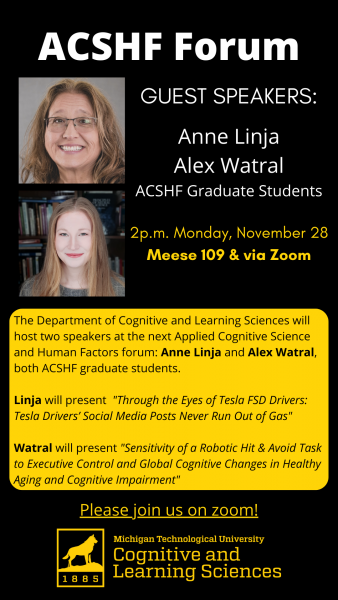The Department of Cognitive and Learning Sciences will host ACSHF PhD Students Anne Linja and Alex Watral at the next Applied Cognitive Science and Human Factors forum. Their presentations will be from 2:00 to 3:00 p.m. Monday (November 28) in Meese 109 and via Zoom.
Linja will present her research titled “Through the Eyes of Tesla FSD Drivers: Tesla Drivers’ Social Media Posts Never Run Out of Gas”
Abstract: With the recent deployment of the latest generation of Tesla’s Full Self-Driving (FSD) mode, consumers are using semi-autonomous vehicles in both highway and residential driving for the
first time. As a result, drivers are facing complex and unanticipated situations with an unproven technology, which is a central challenge for cooperative cognition. One way to support cooperative
cognition in such situations is to inform and educate the user about potential limitations. Because these limitations are not always easily discovered, users have turned to the internet and social media
to document their experiences, seek answers to questions they have, provide advice on features to others, and assist other drivers with less FSD experience. In this presentation, I will explore a novel approach to supporting cooperative cognition: Using social media posts can help characterize the limitations of the automation in order to get information about the limitations of the system and explanations and workarounds for how to deal with these limitations. Ultimately, our goal is to determine the kinds of problems being reported via social media that might be useful in helping users anticipate and develop a better mental model of an AI system that they rely on. To do so, we examine a corpus of social media posts about FSD problems to identify (1) the typical problems reported, (2) the kinds of explanations or answers provided by users, and (3) the feasibility of using such user-generated information to provide training and assistance for new drivers. The results reveal a number of limitations of the FSD system (e.g., lane-keeping and phantom braking) that may be anticipated by drivers, enabling them to predict and avoid the problems, thus allowing better mental models of the system and supporting cooperative cognition of the human-AI system in more situations.
Watral will present her research titled “Sensitivity of a Robotic Hit & Avoid Task to Executive Control and Global Cognitive Changes in Healthy Aging and Cognitive Impairment”
Abstract: We recently found that a rapid motor decision-making task is sensitive to age differences in executive control and can isolate the cognitive from the sensorimotor contributions to task performance (Watral & Trewartha, 2021). However, we are also interested in this task’s ability to distinguish between healthy aging and cognitive impairment as seen in the early stages of Alzheimer’s. In this presentation, I will revisit the results from Watral & Trewartha (2021) and show preliminary findings comparing task performance between healthy older adults and those who exhibit cognitive impairment. Additionally, task parameters thought to be associated with executive control will be compared to a traditional measure of executive functioning (Trail Making Test) and a global measure of overall cognitive functioning (Montreal Cognitive Assessment).
